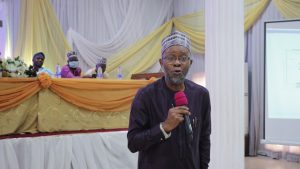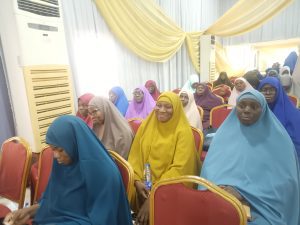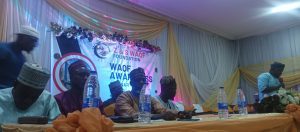• Seeks cross-fertilisation of ideas
• Two years on, Z&S Waqf chief tells success stories, expectations
The Chief Executive Officer of Jaiz Charity and Development Foundation, Dr. Abdullahi Shuaib, has stressed the need for increased awareness campaigns on waqf in Nigeria.
Dr. Shuaib said the lack of adequate public enlightenment on waqf is one of the factors responsible for the limited waqf projects in the country.
He made this statement as the guest lecturer at a Waqf Awareness Seminar organised by the Zakat & Sadaqat Waqf Foundation on Saturday, October 28.
The seminar which took place at the Lagos Chambers of Commerce and Industry, Ikeja, Lagos, had the topic ‘Understanding the Concept of Waqf as an Islamic Social Finance Instrument’.
Dr. Shuaib described waqf as an instrument under Islamic social finance which can be undertaken by both the rich and the poor for societal development and public good.
“We need to step up our awareness campaign. We need to remove the fog in the eyes of those who are supposed to be the major drivers of this waqf initiative. They need to understand the meaning of the concept; how it’s being applied in different climes; and to understand our own terrain so that we avoid those pitfalls that can make individuals or corporate organisations who want to thread the path of establishing waqf derail or fall,” he said.

The guest lecturer also noted that most people in Nigeria only give theoretical explanations on waqf without having concrete understanding of its practical application.
He advocated intensive cross-fertilisation of ideas among Islamic organisations so that more people would have the required expertise on waqf.
He said, “We need to also do intensive cross-fertilisation of ideas with Islamic organisations. Most Islamic organisations have a stand-alone attitude of doing things. That cannot take the community far. We need to have this cross-fertilisation of ideas so that if an organisation is endowed with a lot of people with capacity, they can also train people in other organisations to shoot up their own capacity. The more we have waqf institution, the better for the ummah.”
The Jaiz Foundation chief also highlighted the role of constitutional conflict in the low impact waqf has made in the country, noting there are no provisions for the instrument at the federal government level.
“There is also constitutional conflict on waqf and how waqf should be done. If we go by our constitution, at the federal level, there are no provisions for waqf. At the state level, there are provisions for it if the state assembly desires it. In the event that there are clashes, the same constitution will tie the hands of the state waqf-based organisations because the body that is responsible for coordinating and regulating waqf is domiciled at the federal level. To that extent, you discover again that there are conflicts. This may also be a reason why many of the states are not having very big waqf projects compared to what we have seen in other climes,” he stated.
According to him, Waqf projects do not only benefit Muslims, as they are for public good.
“Even idol worshippers will benefit from waqf. Waqf is different from Zakat which is one of the pillars of Islam. Waqf is an instrument under Islamic social finance that we can use to bring public good, be it hospital, school, businesses, community development, welfare and other things that can impact positively.

“Zakat is one of the pillars of Islam. It is something every Muslim cannot compromise. If you liable to pay Zakat having met the minimum threshold called Nisab, you must pay it. It is on the same level with salat. When somebody has attained the age of puberty, he does not have excuse not to observe prayer as a Muslim. Same thing with Zakat. When your wealth has attained that minimum threshold, you must give out 2.5 per cent of it. But waqf is not a pillar of Islam. It is just an instrument or a tool under Islamic social finance. And it is a tool that both the rich and the poor can embrace. It is voluntary.
“Waqf can also come in form of cash contribution for a project. When the project is implemented, it becomes a property that nobody can lay claim to. It is now a public property for public good. It is going to be managed by a group of specialised individuals under the Waqf Management Board. These individuals are also not the owners of the project. It belongs to Allah because it has been dedicated as an endowment to bring public good.”
Dr. Shuaib charged waqf stakeholders to engage local government authorities to explore partnership opportunities.
“We also need to engage the government, especially at the local level. The local government is the closest to the people. It is where the people will feel the impact of government. We can partner with the local government, especially for organisations that have the resources and capacity, to be able to let people see the good side of waqf and how it works and how it can complement whatever effort the local government is giving out to the people. When they see this working, I’m sure the state government will embrace this particular instrument. The end result is good governance.”
In his own remarks, the Executive Director and Chief Executive Officer of Z&S Waqf Foundation, Mr. Maruf Ahmed, said their organisation is two years in existence.
“In the last two years, we’ve been able to gather some cash waqf to start hostel projects that will enhance accommodation for students at a cheaper rate, and still bring in revenue,” he said.

“We already have an acre of land at Tai Solarin University of Education, Ijebu-Ode. The objective is to get a hostel accommodation for students that will be affordable and also generate revenue to develop more of such project. We also have a building we want to secure in Shagamu. It is very close to Olabisi Onabanjo University Teaching Hospital, where medical students can have access to as accommodation.
“We have a building donated by a philanthropist. In waqf, you can be specific. So, when he was donating that building, he said he wants us to use it for school. The school should generate revenue that will take care of a specific number of orphans. We have started the school this session. We hope the school will grow so that we meet the aspiration of the donor.”
The Executive Director also mentioned that Z&S Waqf Foundation is targeting a diagnostic centre project for which fundraising is ongoing.
“Most people die today not because of the severity of the ailment, but for not knowing they have the ailment in time, which will have assisted them in tackling the ailment. They can’t access diagnosis because of the cost. So, we are targeting to build a diagnostic centre where people can get cheaper rates. We have raised about 50 million for the project. However, since the fund we need is yet to complete, we have invested the one on the ground in sukuk. The value of the capital must not diminish. By the time we get enough funds we can sell the certificate and build up.”
He said his organisation will continue to push public enlightenment on waqf, as he admitted that there is limited awareness on it.

He asked Muslims in Nigeria to join them on their various waqf projects.
“We call on people with the means to partner Z&S Foundation on our projects so that we can touch the lives of the downtrodden citizens in Nigeria. The benefit is perpetual. The Prophet (SAW) said the waqf you do yourself is far more meritorious than the one done on your behalf after death.”
On his part, the chairman of the occasion, Dr. AbdulGaniy Shopeyin, said the waqf projects of Z&S Waqf Foundation are already transforming the society.
The former Executive Chairman of Lagos SUBEB said virtual programmes should be embraced in the awareness campaigns on waqf, noting it is a social media age.
“We must ensure that we do not limit our enlightenment campaigns and lectures to people working for Zakat & Sadaqat Foundation alone. We can even engage Christians. This is a technology oriented world. We can have virtual programmes on it so that everybody will know. A lot of Muslims still do not know the meaning of waqf. I have learnt a lot today. I believe so many people out there too need to learn. It is not difficult. It is a simple thing that everybody can do.
We can achieve many waqf sponsored projects in Nigeria too. But it is by educating the people. We should let people know what waqf is about. By the time people know, you’ll begin to see a lot of changes here and there. You can imagine what we will get if a thousand people contribute 10 naira for a waqf project. The essence of waqf will then be taken care of.”



